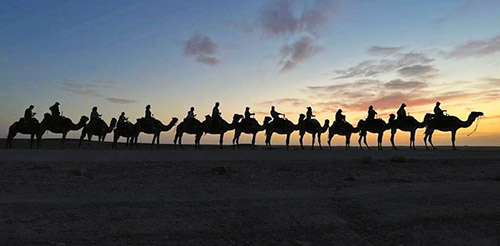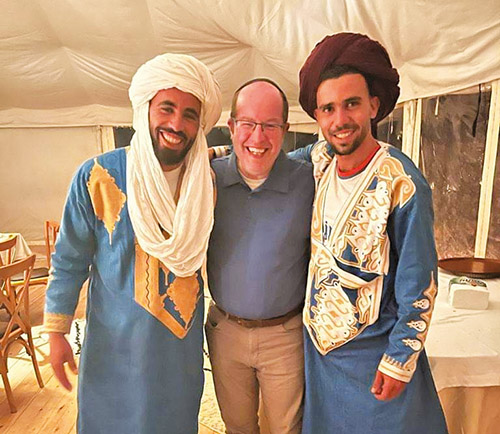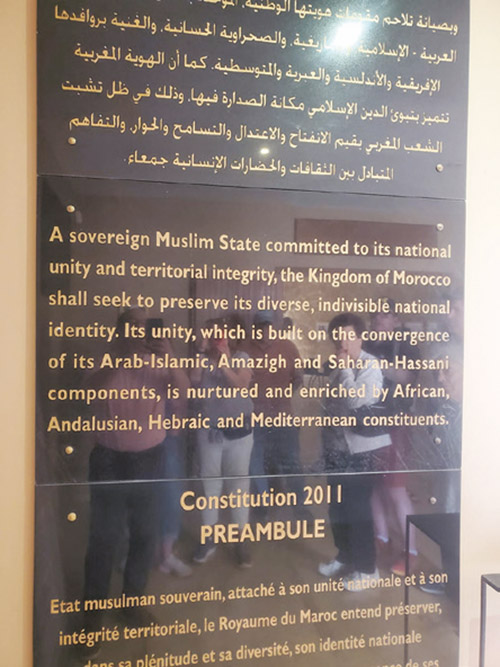
I have been attending Congregation Agudath Sholom, a Modern Orthodox synagogue in Stamford, my entire life. Every year Agudath Sholom hosts many unique events and activities for multiple generations. This year the shul decided to try something new, a trip to Morocco.
One day one of the members of the congregation suggested to Rabbi Daniel Cohen, the shul’s senior rabbi, that he should lead a trip to Morocco since there is a lot of rich Jewish history surrounding the Muslim country of Morocco. Thus, Rabbi Cohen looked into details and planned an exciting nine-day trip with a tour company. Around 17 members of the community joined together for this enlightening journey throughout Morocco in exotic cities such as Casablanca, Marrakesh and Fez. The trip also included sunset camel rides in the desert and kosher Moroccan catered meals even in the tents in the desert.
Why out of all the places to visit in the world did Agudath Sholom conduct a trip to an Arab country? For starters, Morocco has a long history of being supportive of the Jewish people. Most people don’t even know that a Muslim country has a good relationship with Jews. Morocco is one of the only Arab countries that supports the Jewish nation. Diane Cohen, Rabbi Cohen’s wife, mentioned how she never felt unsafe in Morocco, which is not common for a Jew in an Arab country.

The guide was a very knowledgeable Muslim man who took the group to many different Jewish sites and synagogues. The purpose of the trip was to see the history of the Jewish people in Morocco and to understand how Moroccan Jews coexist with their Arab neighbors. Diane mentioned how one can “see potential for peace with other Arab countries when you are in Morocco.”
Originally, there were around 250,000-350,000 Jews living in Morocco; currently there are around 5,000 Jews. However, since Morocco signed the Abraham Accords back in 2020, the country is estimated to have around 600,000 Jews visiting, mostly Israelis, and hopefully these numbers are only increasing now that Israel and Morocco have full diplomatic relations.
Many things resonated with Diane; however, two things stuck out the most. The first one followed every time Rabbi Cohen expressed “Salaam Alaikum” to Moroccans on the street. They would respond in a positive manner and then say “Shalom” because the Moroccans could tell the group was Jewish. There are not many Arab countries, let alone countries besides Israel, that most people will respond to Jews in such a positive manner, which is really special. The second part of the journey that stuck with Diane was the mosque that both Muslims and non-Muslims can enter. Diane detailed how the inside is “beautiful, with ceramics, carvings, wood, etc. Even though the outside is not so ornate, the inside is stunning.” This gave her a sense of the awe people must have had when going to the Beit Hamikdash.

Overall, the trip was a major success. Everyone loved it and felt safe, and maybe one day if there is enough of a demand Agudath Sholom will organize another trip.
Dinah Miller Marlowe, a long-time congregant of Agudath Sholom who attended the trip with her husband Seth Marlowe summarized it well: “The highlight of this trip was all the shuls and cemeteries and the souks (Arab markets/bazaars) and the Medinas (part of the walled in historical town center) and the Mellah (Jewish Quarter). In addition, meeting the Moroccan locals was so enlightening, and to be in a Muslim country where we were welcomed as a Jewish group was remarkable.”
At the end of the day, it is important to learn from more than just Jewish people, and one of the most special aspects of Morocco is that they pay respect to the Jewish nation even in their constitution. (picture below).
Julianne Katz is a staff writer for The Jewish Link currently spending her gap year in Israel.








